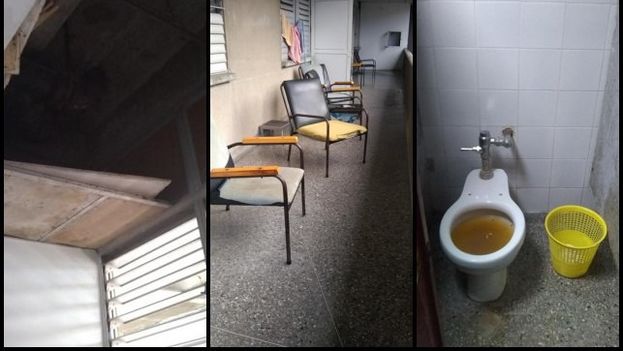
![]() 14ymedio, Yosvany Hernández, Pinar del Río, January 21, 2019 — The deplorable state of many Cuban hospitals and the dreadful nature of their services is no secret. But there is a false conception in the popular imagination that if you have money, life flows, even when it comes to hospital treatment.
14ymedio, Yosvany Hernández, Pinar del Río, January 21, 2019 — The deplorable state of many Cuban hospitals and the dreadful nature of their services is no secret. But there is a false conception in the popular imagination that if you have money, life flows, even when it comes to hospital treatment.
I want to share with you the story that shattered that myth for me. It is the experience of a friend who was in a car crash and spent three days in Abel Santamaría Hospital, in the city of Pinar del Río.
My friend is German. Although I was convinced that the service would be costly, I thought that she would have the best treatment, because of that widespread belief that foreigners have priority. continue reading
Upon her arrival, the emergency room was packed with patients and she had to be seen in a room with no privacy (nor beds). I don’t know whether because of protocol or lack of management, she remained stranded on the same stretcher on which she arrived, right next to an open and overflowing wastebasket.
The first checkup was the most similar to that song about elephants balancing on a spider’s web, only that these white-coated elephants would touch, go, come, whisper, wait, et cetera, to, once in a while, ask one or another bilingual question (half Spanish and half sign language).
They did some routine procedures: ultrasounds, x-rays, and blood analysis.
Then “the attending comrade” appeared, that is to say the person responsible for counting and charging every movement of personnel and resources moving around the foreign patient. My instinct as a good Cuban senses mystery and adult language like in the Saturday movie.
So far nobody had addressed her to explain what was happening, nor what the procedures would be, but the accountant comrade managed to inform the patient that the hospital didn’t have a connection with her insurance and that, to avoid delays in treatment, she should pay in cash for the services she was going to receive. Despite this not being an appropriate conversation for a moment like this, the patient, who luckily was conscious and wasn’t traveling alone, agreed.
The first diagnosis was encouraging, only a fracture of the collarbone, immobilization, eight hours in observation, and she could return home. The rooms meant for foreign patients were full and, after 3 hours, they put her in another room with worse conditions for which she had to pay the same price, 10 CUC per hour.
Each consultation 30 CUC, 25 CUC for x-rays, and the ultrasound, which in the words of the little economy comrade was a little more expensive, 300 CUC; plus 50 CUC for a gauze bandage to immobilize the shoulder.
After eight hours during which there was very little observation, due to protocol, two exams with their respective additional costs had to be repeated. The same ones had to be examined by a second orthopedist, which meant waiting until the next day.
The second orthopedist suspects a fracture in the spine and suggests an MRI. At this point my friend had been in pain for 18 hours, without cleaning herself up nor understanding how, after charging her for so many x-ray exams, there still wasn’t certainty about her health status.
An incomplete MRI (400 CUC) produced a spinal fracture, and after repeating it (300 CUC), another break appears. Hours pass and the bill rises.
She had read many good things about Healthcare in Cuba, and she wasn’t expecting that her situation could be complicated, but faced with the dreadful appearance of the place and with such a diagnosis she decided to transfer to Havana.
After resolving the bureaucratic problems and with a pinch of persistence, now that the official who attended foreigners claimed that it was not necessary to transfer her, it was 6:00 in the evening. And interprovincial ambulances don’t run at night.
On the morning of the third day the ambulance finally arrived.
During the entire stay not even an orderly appeared. It was necessary to do two MRIs and, each time, someone had to go to look for the technician at his house. Even more disappointing than the lack of medications, inappropriate conditions, and several references to the economic blockade was the apathy of the majority of the doctors, the bad treatment, and, above all, the evasion of responsibility.
After paying $1,697 at the ambulance door for terrible service and an unreliable diagnosis, she was left with only the hope of that hospital in Havana where all the foreigners go, and which, as they told her by telephone, was the best.
We Cubans don’t have that hope, because what we’ve got is that one, that of mistreatment, that of the horror movie.
It is very difficult to preserve, after hearing this story, the image of the eternal humanitarian, the good Samaritan of so many international medical missions.
Translated by: Sheilagh Carey
___________________
The 14ymedio team is committed to serious journalism that reflects the reality of deep Cuba. Thank you for joining us on this long road. We invite you to continue supporting us, but this time by becoming a member of 14ymedio. Together we can continue to transform journalism in Cuba.
